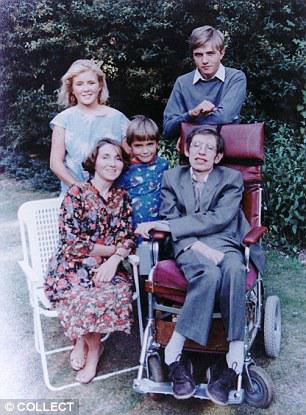
The world-famous physicist Stephen Hawking has always been regarded as a man apart, both for his intelligence and because the effects of disease forced him to communicate with an electronic voice. But for his son Tim, the famous monotone drawl(单调拖腔) of the speech box was not the barrier to a loving bond that many might expect — in fact it proved to be the key.
Indeed, as he admits he spent his earliest years unable to understand his father’s speech. “My dad was able to speak with his own, natural voice for those first years, but it was difficult to understand what he was saying — particularly for me at such a young age,” says Tim. “As a three-year-old, I had no understanding of what he was saying. I didn’t really have any communication with him for the first five years of my life. It was only when he got his voice synthesizer(声音合成器) that I was actually able to start having conversations with him. It was somewhat ironic that Dad losing his voice was actually the start of us being able to form a relationship.”
Father and son shared a passion for motor-racing and would often join Formula 1 champion Frank Williams, who was also in a wheelchair. But it was a piece of advice given to him by his father when he was 12 that Tim has treasured the most. “I remember asking him a question which at the time I thought was a bit silly. I wanted to know if there were lots of other tiny universes dotted around. He gave me the answer and then he told me never to be afraid to come up with an idea or a hypothesis no matter how silly it might seem,” says Tim, who graduated from Exeter University and now works in marketing for the toy firm Lego. “He said that the most important thing was to have the confidence to follow it through, and I think that has been a great lesson for me.”
Hawking, 73, was given just two years to live when he was diagnosed with motor neuron disease(运动神经元病) in 1963. He suffered life-threatening pneumonia(肺炎) in 1985 and was given a treatment which removed what remained of his speech.
本时文内容由奇速英语国际教育研究院原创编写,禁止复制和任何商业用途,版权所有,侵权必究!
1.Why didn’t Tim have any communication with his father before age five?
A His father couldn’t speak with his natural voice.
B His father used the speech box to communicate.
C He couldn’t understand what his father said.
D He was too young to understand his theory.
解析:选C。C 推理判断题。根据文章第二段的“but it was difficult to understand what he was saying”以及“I had no understanding of what he was saying”可知Tim 听不懂他的父亲说话,所以他 5 岁以前和父亲几乎没有任何交流。故选 C。
2.When did Tim finally begin to communicate with his father?
A After his father recovered from the illness.
B After his father got a wheelchair.
C After his father got a voice synthesizer.
D After they talked about physics.
解析:选C。C 细节理解题。根据第二段的 It was only when he got his voice synthesizer that I was actually able to start having conversations with him 可知在父亲有了声音合成器之后他们才开始真正交流。故选 C。
3.Tim and his father are both interested in _________.
A motor-racing
B languages
C marketing
D universes
解析:选A。A 细节理解题。根据第三段第一句的 Father and son shared a passion for motor-racing and would often join Formula 1 champion Frank Williams...可知他们父子对赛车都感兴趣。故选 A。
4.What’s the lesson that Hawking taught his son?
A Being careful with the new ideas.
B There were many tiny universes.
C Answering a question however silly.
D The importance of following ideas through.
解析:选D。D 推理判断题。根据第三段最后一句的“He said that the most important thing was to have the confidence to follow it through, and I think that has been a great lesson for me.可知蒂姆认为他的父亲教给他最重要的是要把一个想法坚持到底。故选 D。